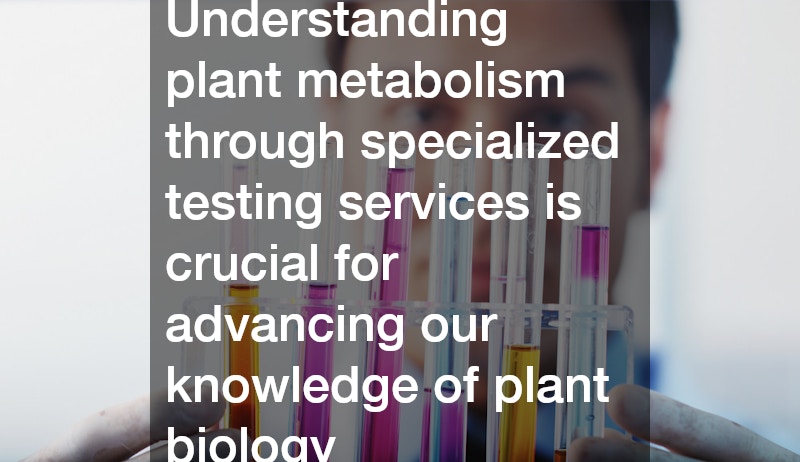Plant metabolism testing is a crucial component in the understanding of how plants grow, respond to stimuli, and adapt to their environments. This testing plays a valuable role in fields ranging from agriculture to pharmaceuticals and environmental science. With the increasing demand for sustainable practices and innovation, plant metabolism testing services are becoming an important part of scientific research and commercial development. In this blog post, we’ll explore five fascinating facts about these services and why they are essential in understanding plant systems and improving various applications.
Fact 1: Targeted Analyses of Metabolites
Metabolite profiling in plant metabolism testing allows researchers to target and measure specific metabolites crucial to various plant functions. This targeted analysis helps identify the role of certain compounds in plant growth and stress response. For instance, the presence of certain metabolites might indicate a plant’s method of water conservation during drought conditions. The ability to pinpoint these metabolites facilitates the development of drought-resistant crops, contributing to more sustainable agricultural practices. Understanding these metabolites helps scientists and farmers make informed decisions about crop management.
Fact 2: The Role of Advanced Technology
Advanced technologies such as mass spectrometry and chromatography are integral to plant metabolism testing services. These technologies allow researchers to accurately quantify metabolites and gain insight into complex biochemical pathways. The precision and depth of data provided by these technologies enable the identification of novel metabolites with significant potential in both agricultural and pharmaceutical applications. Such innovations often lead to the discovery of natural products with medicinal properties, demonstrating the versatile benefits of understanding plant metabolism. As technology evolves, so does the scope for deeper plant analysis.
Fact 3: Uncovering Environmental Interactions
Plant metabolism testing services also play a key role in environmental science by revealing how plants interact with their surroundings. These interactions include nutrient uptake, response to pollutants, and adaptation to changing climates. By analyzing how environmental factors affect metabolic pathways, scientists can develop strategies to enhance plant adaptation and resilience. For example, identifying specific pathways that are activated under stress conditions can lead to the bioengineering of plants better suited to harsh environments. This understanding is crucial for developing climate-resilient crops.
Fact 4: Contributions to Biotechnology
In biotechnology, plant metabolism testing services offer invaluable data that drive innovation in genetic engineering. By dissecting the metabolic pathways of a plant, researchers can manipulate genetic material to produce desired traits, such as improved nutritional content or increased yield. Additionally, these services support the development of biofuels by optimizing plants for greater energy output. The insights gained from these tests not only enhance agricultural productivity but also contribute to sustainable energy solutions. Through these contributions, plant metabolism testing empowers a more sustainable biotechnological industry.
Fact 5: Economic Impact
The impact of plant metabolism testing services extends beyond science, influencing economic growth within the agriculture and biotech sectors. Services that enhance crop yield and quality can significantly affect market dynamics and food security. This is especially true in regions where agriculture is a primary economic driver. By improving plant robustness and productivity, these services help ensure a steady supply chain, stabilizing food prices and supporting farmers’ livelihoods. Therefore, investing in plant metabolism testing can lead to long-term economic benefits, contributing to global food security efforts.
Understanding plant metabolism through specialized testing services is crucial for advancing our knowledge of plant biology and addressing some of the world’s most pressing challenges. From supporting agriculture through better management practices to driving innovations in biotechnology, these services offer a wealth of opportunities. The combination of targeted metabolite analysis and advanced technologies ensures that we continue to uncover the hidden potential of plant systems. As we move towards a future where sustainability is paramount, the insights provided by plant metabolism testing services will be vital in fostering a greener and more productive world. These advancements not only allow for the development of more resilient crops and efficient agricultural practices but also help in the optimization of resource usage, which is essential in the face of climate change and growing global populations. Embracing these scientific innovations not only benefits the environment but also contributes to economic and social resilience by promoting sustainable food production, job creation, and improving the quality of life. Ultimately, plant metabolism testing services represent a cornerstone in creating a more sustainable and interconnected world, helping humanity meet the challenges of the 21st century.
.




